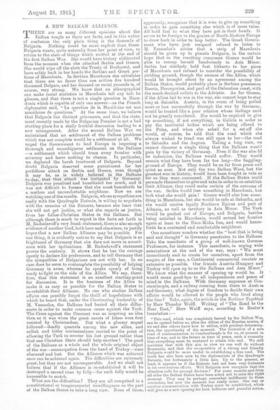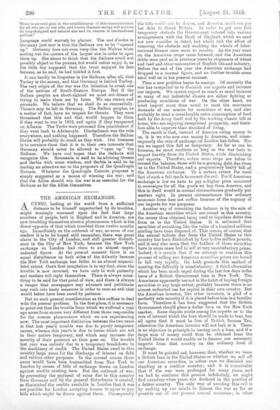A NEW BALKAN ALLIANCE.
THERE are as many different opinions about the Balkan tangle as there are facts, and in this welter of confusion the only plain thing is the demands of Bulgaria. Nothing could be more explicit than these. Bulgaria wants, quite naturally from her point of view, to return to the state of things which existed at the end of the first Balkan War. She would have history obliterated from the moment when she attacked Serbia and Greece. She would wipe off the slate the Treaty of Bucharest, and have safely back in her bands the Serbian and Greek por- tions of Macedonia. In Serbian Macedonia she calculates that there are no fewer than one million five hundred thousand Bulgars, and her demand on racial grounds is, of course, very strong. We know that an. ethnographist can make racial statistics in Macedonia tell any tale he pleases, and that there is not a single question in Mace- donia which is capable of only one answer—as the French diplomatist said, " La question de la. Macedoine est une macedoine de questions." At the same time, we believe that Bulgaria has distinct grievances, and that the state- ment recently made by the Bulgarian Premier is not a bad starting-place for a really fruitful discussion leading to a new arrangement. After the second Balkan War we maintained that no settlement of the Balkan problems which was not complete would be a settlement at all. We urged the Government to lead Europe in imposing a thorough and unambiguous settlement on the Balkans —a settlement which should trace every frontier with accuracy and leave nothing to chance. In particular, we deplored the harsh treatment of Bulgaria. Beyond doubt Bulgaria deserved some punishment for her perfidious attack on Serbia and Greece, even though it may be, as is widely believed in. the Balkans to-day, that that attack was instigated by Germany. Bulgaria was penalized and humiliated too much, and it was not difficult to foresee that she must henceforth be a restless and uncomfortable neighbour. Now we are watching one of the results. Bulgaria, whose sympathies are really with the Quadruple Entente, is willing to negotiate with the enemies of the Entente, because she fears that she will not get justice, or what she regards as justice, from her fellow-Christian States in the Balkans. But although there is much to regret in the facts set forth in M. Radoslevoff's very frank statement, there is also enough evidence of another kind, both here and elsewhere, to justify hopes that a new Balkan Alliance may be possible. For one thing, it is evidently untrue to say that Bulgaria is so frightened of Germany that she dare not move in accord- ance with her inclinations. M. Radoslavoff's statement proves the contrary. It shows that he has the courage openly to declare his preferences, and to tell Germany that the sympathies of Bulgarians are not with her. In no case does be seem to contemplate the possibility of helping Germany in arms, whereas he speaks openly of being ready to fight on the side of the Allies. We say, there- fore, that this statement is an excellent starting-point for discussion. It is the business of the Allies to make it as easy as possible for the Balkan. States to re-establish their Alliance. No one who studies Balkan affairs can possibly forget the. thrill of hopefulness with which he heard that, under the illuminating leadership of M. Venezelos, the Balkans had buried all their differ- ences in order to make common cause against the Turk. The Cross against the Crescent was as inspiring an idea then as it was when the great onsets of 'slam were first resisted by Christendom.. But what a gloomy sequel followed—deadly quarrels among the new allies, and selfish and bitter recriminations carried to the point of allowing the Turk to recover his lost ground rather than that one Christian State should help another The good of the Balkans as a whole and the whole original object of the war—emancipation from the hand of Turkey—were obscured and lost. But the Alliance which was achieved once can be achieved again. The difficulties are extremely great, but they are not unconquerable. And we shall not believe that if the Alliance is re-established it will be destroyed a second time by folly—for such fully would be impossible to match. What are the difficulties ? They are all comprised in a constitutional or temperamental unwillingness on the part of the Balkan States to take a long view. None of them, apparently, recognizes that it is wise to give up something in order to gain something else which is of more value. All hold fast to what they have got iu their hands. It seems to be foreign to the genius of South-Eastern Europe to draw back in order to leap better. The Greek Govern- ment who have just resigned refused to listen to M. Venezelos's advice that a strip of Macedonia should be given up to placate Bulgaria, in the certain hope that in the resulting conquests Greece would be able to recoup herself handsomely in Asia Minor. Serbia has similarly held fast hitherto to her piece of Macedonia and refused to consider the possibility of yielding ground, though the success of the Allies, which would be brought about by an agreement among the Balkan States, would probably place in Serbian possession Bosnia, Herzegovina, and part of the Dalmatian coast, with the much-desired outlets to the Adriatic. As for Greece, if the Allies fail to win in the war, she cannot hope to stay long at Salonika. Austria, in the event of being pulled more or less successfully through the war by Germany, would be treated like a poor relation whose feelings need not be greatly considered. She would be required to give up something, if not everything, in Galicia in order to pay the territorial bribes which are being offered to the Poles, and when she asked for a. set-off she would, of course, be told that the road which she always wished to tread was still open to her—the road to Salonika and the Aegean. Taking a long view, we cannot discover a single thing that the Balkans would gain by the victory of Germany. Even if the war shouid be indecisive, the Balkans would suffer. They would remain what they have been far too long—the haggling- ground of Europe. They would be as far from peace and quiet as ever. Not only the two Balkan Wars, but the greatest war in history, would have been fought in vain so far as they were concerned. If the Balkan States could persuade themselves to give and take iu order to re-establish their Alliance, they could make certain of the outcome of the war. Serbia would lose something in Macedonia, but look what she would gain ! Greece would also lose some- thing in Macedonia, but she would be safe at Salonika, and she would receive legally Northern Epirus and part of Albania, as well as territory in Asia Minor. The Turk would be pushed out of Europe, and Bulgaria, besides being satisfied in Macedonia, would extend her frontier again at least to the Enos-Midia line, and would hence- forth be a contented and comfortable neighbour.
One sometimes wonders whether the " best that is being said and thought" in Germany penetrates to the Balkans. Take the manifesto of a group of well-known German Professors, for instance. This manifesto, in urging wide annexations at the end of the war, says : " We must immediately seek to create for ourselves, apart from the empire of the seas, a Continental commercial enceinte as extensive as possible. Our friends Austria-Hungary and Turkey will open up to us the Balkans and Asia Minor." We know what the manner of opening up would be. It would mean good-bye to all independence and peace of mind in. the Balkans. With Germany supreme at Con- stantinople, and a railway running from there to Austi is and Germany, what degree of freedom to decide their own affairs would be allowed to the people who lived along the line ? Take, again, the article in the Berliner Tageblatt by Herr Theodor Wolff. Writing of " The Road to the Near East," Herr Wolff says, according to Reuter's translation :— " This road, which was completely barred by the Balkan War, can be opened before us, after the defeat of the Russian armies, if we and also others know how to utilize, with prudent determina- tion, the opportunity of the moment. The formation of a safe road of communication to Constantinople is for us, at present in time of war, and in the future in time of peace, such a necessity that everything must be ventured to attain this end. We still maintain that with this aim in view Ave can well do without Roumania, and that the co-operation of a strong and friendly Bulgaria would bo more useful in establishing a free road. The truth has also been seen by the diplomatists of the Quadruple Entente, but fortunately a little late. Up to the present, at least, it appears 'as if the Entente had not been very fortunate in its over-zealous efforts. Will Bulgaria now recognize that the situation calls for prompt decision ? For some months and from all sides the Balkan States have been asked not to miss the right moment. They may be perhaps somewhat indifferent to those reminders, but now the moment has really come. One way or another communication with Turkey must be established, which will give us a now opening for both bellicose and peaceful action.
There is assured gain in the establishment of this communication for all who are on our side, and herein German energy will achieve its long-designed and natural aim and its success in international politics."
Language could scarcely be plainer. The snot d'ordre in Germany just now is that the Balkans are to be "opened up." Germany does not even weep like the Walrus when sorting out the oysters of the largest size in order to open them up. She seems to think that the Balkans could not possibly object to the process, but would rather enjoy it, as the little boy supposed that the trout enjoyed its fate because, as he said, he had tickled it first.
It can hardly be forgotten in the Balkans, after all, that Turkey is the enemy, and that Germany is behind Turkey. The very origin of the war was the intention to crush one of the nations of South-Eastern Europe. But if the Balkan peoples are short-sighted we must not dream of trying to make them see by force. We can reason and persuade. We believe that we shall do so successfully. Threats may be left to Germany. The Balkan peoples, as a matter of fact, have no respect for threats. They were threatened that this and that would happen to them if they went to war in 1912, and again if they trespassed on Albania. The Turks were promised dire punishment if they went back to Adrianople. Disobedience was the rule everywhere, and nothing happened. Therefore the Balkan States will probably do much as they wish. Our business is to convince them that it is in their own interests that Germany should never be allowed to " open up " the Balkans. We have real hopes that the Balkans will recognize this. Roumania is said to be advising Greece and Serbia with some wisdom, and Serbia is said to be lending an attentive ear to the proposals of the Quadruple Entente. Whatever the Quadruple Entente proposes is simply suggested as a means of winning the war; and that the Allies should win the war is as essential for the Balkans as for the Allies themselves.



































 Previous page
Previous page